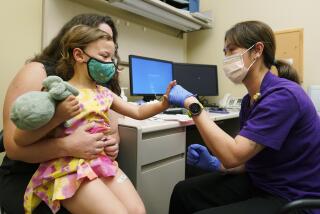Program Eases Jitters Over Child’s Surgery
- Share via
As stresses go, it’s a big one for most parents: watching as your child is wheeled off to the operating room.
To ease the ordeal, some hospitals now allow parents to stay with their children while general anesthesia is administered, thus eliminating separation anxiety.
Although there are no statistics on the number of hospitals with such a policy, it is “a growing trend,” says a spokesman for the National Assn. of Children’s Hospitals and Related Institutions in Virginia.
If the program isn’t in place at your hospital, there are other measures parents can take to ease pre-surgery jitters.
*
The Debate: Physicians remain sharply divided about the practice, which has been in place at some major children’s hospitals for years. Advocates say it reduces psychological stress all-around. Critics worry that parents, unfamiliar with the operating room environment, will hinder good medical care, make their children more anxious or even faint.
*
The Program: Those fears have proved mostly groundless, says Dr. Robert Kalayjian, an anesthesiologist at Long Beach Memorial Medical Center, where a program allowing parents to accompany their children to the operating room began about three years ago.
“It’s presented as an option by surgeons who encourage it,” Kalayjian says. “Some parents now request it. But it’s controversial. Not all our surgeons agree to participate.”
The program is especially helpful, he finds, for children 2 to 6 years old, when separation anxiety tends to be greatest. But there are exceptions, and he has even allowed parents of 16- and 17-year-olds to participate.
*
The Caveats: It’s important that parents be briefed. Kalayjian gives parents a verbal description and tells them that the entire stay in the operating room will probably be less than five minutes. He lets them know that their children may “go limp” very quickly--a normal effect of anesthesia administration that might alarm the uninformed.
The program is for non-emergency surgeries such as tonsillectomy, hernia repair and ear tube placements (myringotomy), he adds, not for emergency procedures.
It’s not generally advised, either, for major pediatric operations such as organ transplants and open-heart procedures, adds Dr. Theodore Striker, an anesthesiologist at Children’s Hospital Medical Center in Cincinnati, where parents are allowed to accompany their children to special induction rooms, adjacent to the operating rooms.
Because of space limitations, many hospitals allow only one parent to accompany the child. The program is “a privilege, not a right,” cautions Dr. Linda Jo Rice, an anesthesiologist at Connecticut’s Hartford Hospital and Newington Childrens Hospital, who helped pioneer the program at Children’s National Medical Center in Washington. “The final decision is up to the anesthesiologist.”
Parents should be screened, adds Dr. Dianne Byerly, an anesthesiologist at Childrens Hospital Los Angeles, who participated in such a program while at the University of Iowa. “I would choose parents carefully,” she says. “If a parent is too anxious, that might be transferred to the child.”
*
The Track Record: Even when briefed, some can’t handle the stress. “About 10 times a year in D.C., we’d have a parent faint or get extremely agitated,” Rice says.
Even parents who seem to sail through find that the experience takes its toll. “Parents often get kind of teary,” Kalayjian says. “Later, they admit it was stressful.” But most say they would do it again, believing it helps the child.
*
Perspective: Ideally, the program should be presented as an option, with parents who feel squeamish not being made to feel guilty. Says Rice: “No psychological studies in the literature indicate this has the slightest long-term benefit.”
Not every parent wants to participate. One survey of 52 parents found that 58% expressed a wish to accompany their child to the OR.
*
The Local Picture: Of eight Los Angeles-area hospitals polled, only Long Beach Memorial has a formal program in place. Five other hospitals (Childrens Hospital Los Angeles, Kaiser, Cedars-Sinai Medical Center, Los Angeles County/USC Med Center and Valley Presbyterian Hospital) say they decide on a “case-by-case” basis.
After a planned remodeling, Childrens Hospital Los Angeles and Children’s Hospital of Orange County might offer the service, spokeswomen say.
At Santa Monica Hospital Medical Center, children are often given pre-medication while the parents are still present to reduce anxiety, says spokesman Ted Braun. Then, if the physicians agree, parents can accompany the children up to the doors of the surgical suite. “Some of our family physicians and pediatricians also accompany the child to surgery, as moral support, if another doctor is performing the surgery,” he adds.
*
Other Measures: The American Society of Anesthesiologists and the American Academy of Pediatrics suggest:
* At the preoperative meeting with the anesthesiologist, ask what to expect in terms of anesthesia. Express your concerns and those of your child. Answer carefully all questions about family history and past surgeries so the anesthesiologist can determine how to care best for your child.
* Try to stay calm. A parent’s soothing voice can go a long way toward keeping a child calm.
* Ask if the hospital provides social workers or other counselors if you or your child is having a tough time facing surgery.






